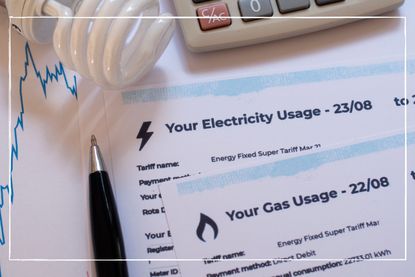Should I fix my energy prices to save money or stay on the price cap?
We explore the benefits of fixed energy prices and discuss if fixing will save you more money than if you stick with the current price cap


Recent updates
This article has been updated to reflect the recent October price cap announcement.
Now that energy prices have started to fall, should I fix my energy prices is an important question to ask yourself.
Many households are still concerned about how much their energy bills will cost, even though the energy price cap dropped by 17% as of July. It will also fall by a further 7% from October. Prices might be coming down, which means cheaper energy bills, but they are still considerably higher than they were before the energy crisis began. Before the crisis hit, fixing your energy tariff was a great way to protect yourself from increasing energy prices and help you budget. For the duration of a fixed-price energy tariff, the price you pay per unit of energy won’t change.
There were many complex reasons why energy prices went going up, but when prices started soaring, many fixed-rate tariffs were removed from sale, and any that remained were more expensive than the energy price cap. (The energy price cap is decided by Ofgem, the energy regulator, and sets a limit on the amount you pay per unit of energy that you use.) But as more suppliers start to offer fixed price deals again, which you will be able to find on our sister site Go.Compare, should you fix or stay on the price cap?
Should I fix my energy prices?
Whether you should fix your energy prices right now is a difficult question to answer as there are fewer suppliers offering fixed-rate tariffs than before the energy crisis, and most of those are only being offered to the supplier's existing customers. As the details of those fixed deals aren't published publicly, money saving expert Martin Lewis has called on Ofgem to instruct suppliers to publish their customer-only deals to help make families make informed choices and understand what kind of deals are available.
Suppliers offering fixed price deals to existing customers include the likes of:
- EDF
- British Gas
- E.On
- Ovo
- Octopus Energy
- So Energy
- Utility Warehouse
But only British Gas, So Energy and Utility Warehouse are offering fixed deals for new customers at the moment. Right now, prices are roughly the same or slightly under the current price cap.
Fixed price tariffs were withdrawn from the market when the energy crisis hit, as suppliers would not have been able to afford to sustain them. The few that cropped up were priced at significantly more than the price cap, or the now-defunct Energy Price Guarantee. But now that prices are starting to come down, we might start to see more fixed-price deals returning.
Energy supplier Ovo became the first supplier to offer a 12 month fixed-rate deal that was cheaper than the price guarantee in March - although money-saving expert Martin Lewis has pointed out that households should be cautious before jumping on a fixed deal, saying: "People need to be very careful not to just jump on a fix because it costs less than they're paying right now."
When fixed deals do come back in abundance, it'll be important to check whether a deal is just cheaper right now, or whether it will actually be cheaper over the length of the fixed tariff, especially if the price cap were to drop again.
In the meantime, use the calculator below to see how your energy bills could change if any further price cap changes are announced.
Fixed-rate tariffs have traditionally been popular as they protect households from energy price rises. If you’re on a fixed rate tariff, changes to wholesale gas and electricity prices won’t affect what you pay. A fixed tariff fixes the price you pay per kilowatt hour (kWh) of energy for the duration of the plan. It doesn’t mean your bill will be the same each month – that will depend on how much energy you use.
In normal market conditions, when energy prices have stabilised, fixed tariffs often work out cheaper than standard or default tariffs.
Important terminology explained
- Energy price cap - This is not the maximum amount you will pay for your energy bills, it's actually the average maximum price you will pay per unit of energy that you use, but is usually stated as an annual average price a typical household would pay, if paying by direct debit. It's set by the energy regulator Ofgem and is reviewed every three months. As of July 2023, this is £2,074. From October 2023, it will drop to £1,923
- Energy Price Guarantee - when the energy price cap got so high during the energy crisis the government introduced a temporary cap, the Energy Price Guarantee, that meant that typical annual energy bills would be no more than £2,500. This scheme ended at the end June 2023.
- Energy tariff - this is set by your supplier and used to calculate your energy bill. Most people will be on their supplier's standard variable, or default, tariff, which means the price you pay is governed by the energy price cap. Some people might find they are being offered fixed-rate tariffs (where the price you pay per unit of energy won't change for the duration of the tariff - normally 12 months)
My fixed tariff is due to expire, should I fix my energy prices again?
If you’re currently on a fixed energy tariff that is due to expire soon, it is worthwhile seeing if you are offered another fixed-price deal from your supplier, although this is likely to be considerably more than you were paying on your previous tariff. You should also check a price comparison website, like Go.Compare, to see if there are any new tariffs that suppliers have released. It's also important to understand how the energy price cap might change again over the course of the next 12 months. It has been confirmed that from October 2023, the energy price cap will drop to £1,923 from its current level of £2,074. Analysts at Cornwall Insight are predicting that the price cap will rise slightly to £1,932 from January 2024, before falling again in April 2024. But these predictions are changing all the time, and nothing is certain until Ofgem confirms what the next cap will be. So deciding whether to fix or not is something of a gamble.
Energy policy expert Sarah Broomfield says: “When your fixed deal is due to expire, your supplier will notify you and then automatically roll you on to their standard variable tariff. You will be free to switch to another deal if you wish to do so, but staying on the standard deal at the moment is most likely the cheapest option."
Whatever tariff you’re on, your bill will be impacted by how much energy you use. So, the key is to try and use less energy if you want to keep your bill low.
Is a fixed energy tariff worth it?
Ultimately, whether you should fix or not is a gamble. Fixing now could protect you from further price hikes, but exclude you from price drops. If you value price certainty more than the cheapest tariff possible, then fixing might be suitable. You can use a price comparison website, such as our sister site Go.Compare, to check what energy tariffs might be on offer and how they compare to what you are paying now.
In normal circumstances, when there isn't an energy crisis, a fixed energy tariff protects you against potential increases in energy costs throughout the duration of the tariff. But at the same time, this means you won’t benefit if prices fall further. Some people prefer being on a fixed-rate tariff as it can help them manage their household budget. This is because the rate you pay per unit of energy won’t change.
But those looking to keep their bills as low as possible, might prefer to stick on a standard variable tariff, and have the price they pay for their energy governed by the energy price cap. If latest predictions come true, this could be cheaper than current fixed price deals that are available.
However it is important to remember than the current price cap of £2,074 is an average annual cost based on typical use. If you live alone in a flat or apartment, your annual bill is likely to be lower than this, and if you live in an larger than typical house and use lots of energy, it's likely to be considerably more. While it is often expressed as an annual figure, the price cap actually caps the price you pay per unit of energy, and not your bills as a whole.
If you're looking to keep your energy bills as low as possible, it's important to know how to save energy at home, and whether you might be able to benefit from a tariff that offers cheaper electricity at night.
Video of the Week
Goodto Newsletter
Parenting advice, hot topics, best buys and family finance tips delivered straight to your inbox.

Emma Lunn is a multi-award-winning journalist who specialises in personal finance and consumer issues. With more than 18 years of experience in personal finance, Emma has covered topics including all aspects of energy - from the energy price cap to prepayment meter tricks, as well as mortgages, banking, debt, budgeting, broadband, pensions and investments. Emma’s one of the most prolific freelance personal finance journalists with a back catalogue of work in newspapers such as The Guardian, The Independent, The Daily Telegraph, the Mail on Sunday and the Mirror.
- Sarah HandleyMoney Editor, Goodto.com
-
 The adorable sign Prince Louis can’t wait to be a future King like his brother Prince George
The adorable sign Prince Louis can’t wait to be a future King like his brother Prince GeorgeThe Wales youngster made a telling move during a secret visit to the Strictly Come Dancing studios
By Selina Maycock Published
-
 This baby name is giving 'retro chic' vibes and it's predicted to be a top choice for parents in 2024 – would you choose it?
This baby name is giving 'retro chic' vibes and it's predicted to be a top choice for parents in 2024 – would you choose it?It’s stolen the limelight right at the last minute
By Daniella Gray Published
-
 Cheapest places for your Christmas dinner staples revealed in new research, but where does your usual supermarket rank on the list?
Cheapest places for your Christmas dinner staples revealed in new research, but where does your usual supermarket rank on the list?New research has ranked the nation's favourite supermarkets from cheapest to most expensive for Christmas dinner essentials
By Sarah Handley Published
-
 'I need to split myself in two to be a working mum' New report lays bare the 'disproportionate impact' childcare has on a mother's career
'I need to split myself in two to be a working mum' New report lays bare the 'disproportionate impact' childcare has on a mother's careerNew research has highlighted the struggle working mothers have trying to balance their work and family life
By Sarah Handley Published
-
 Tooth Fairy tax is a thing, and it's doubled within a generation, but here are 4 money-alternative ideas you could try instead
Tooth Fairy tax is a thing, and it's doubled within a generation, but here are 4 money-alternative ideas you could try insteadToday's parents are paying considerably more for this family tradition than their parents did
By Sarah Handley Published
-
 How to recycle LEGO: can you stick it in the recycling bin and what else can you do with old bricks?
How to recycle LEGO: can you stick it in the recycling bin and what else can you do with old bricks?Knowing how to recycle LEGO is essential for families looking to declutter their toy stash and free up some space
By Sarah Handley Published
-
 When does Black Friday end? Timings of the annual sale weekend explained
When does Black Friday end? Timings of the annual sale weekend explainedBlack Friday 'weekend' is here, but it pays to know when the Black Friday sales end so you can bag a bargain before it's all over
By Sarah Handley Published
-
 Last chance! Get £10 tickets to major UK attractions, including Cadbury World and LEGOLAND Discover Centres in the Merlin Cyber Monday sale
Last chance! Get £10 tickets to major UK attractions, including Cadbury World and LEGOLAND Discover Centres in the Merlin Cyber Monday saleThat's a saving of up to a whopping 52%!
By Sarah Handley Published
-
 Child benefit warning for parents as payment cut off looms
Child benefit warning for parents as payment cut off loomsParents of 16 and 17 year olds could risk losing their child benefit payments at the end of November
By Sarah Handley Published
-
 What is the motherhood penalty? We look at just how women are paying for having children and why
What is the motherhood penalty? We look at just how women are paying for having children and whyNew research estimates that three in four single mothers will struggle to afford essentials in their retirement thanks to the motherhood penalty
By Sarah Handley Published